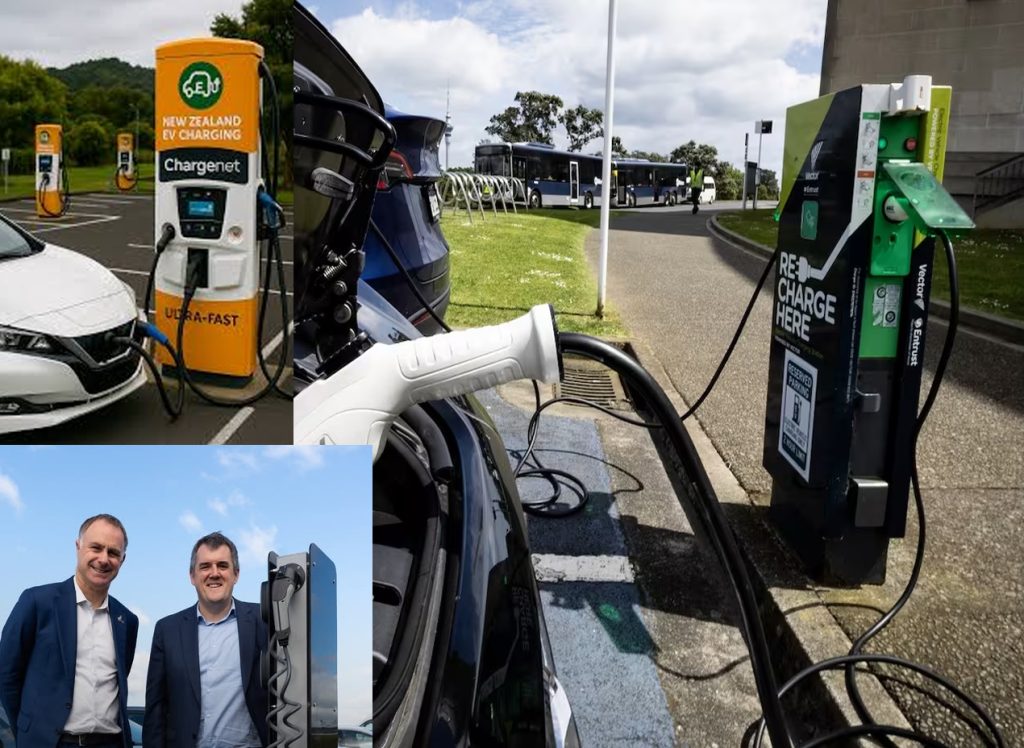
뉴질랜드, 전기차 충전소 7배 확충… 2030년까지 1만기 구축
New Zealand to Boost EV Charging Network Sevenfold by 2030
Private Investment Push to Accelerate Electric Vehicle Adoption
New Zealand’s government has unveiled an ambitious plan to dramatically expand the nation’s electric vehicle (EV) charging infrastructure, aiming to make EVs more accessible and support the country’s climate goals. By 2030, the government intends to increase the number of public charging stations from 1,378 to approximately 10,000—a more than sevenfold expansion. The target is to ensure one charger for every 40 electric vehicles, alleviating drivers’ concerns about range limitations while advancing efforts to combat climate change and reduce household fuel costs.
Low-Interest Loans to Spur Private Investment
Transport Minister Chris Bishop and Energy Minister Simeon Watts recently announced a new policy to fast-track charger installations through partnerships with private companies. Central to the initiative is a NZ$68.5 million (approximately US$41 million) low-interest, long-term loan program. This scheme allows private operators to access up to 50% of installation costs with zero-interest loans, repayable over 13 years.
Bishop highlighted New Zealand’s lag in charging infrastructure, noting, “We currently have one of the lowest charger-to-EV ratios among OECD nations. Without a robust charging network, consumers will hesitate to embrace electric vehicles.” Drawing on the success of the country’s ultrafast broadband rollout, the government aims to stimulate private investment while minimizing taxpayer costs.
Charging Network as a Climate and Economic Win
Energy Minister Watts emphasized the strategic advantage of New Zealand’s energy grid, which derives over 80% of its power from renewable sources. “Expanding EV adoption is a dual victory—cutting greenhouse gas emissions and easing the financial burden of fuel costs for families,” he said. A survey by the Energy Efficiency and Conservation Authority (EECA) revealed that limited charging stations and fears of long-distance travel are the top barriers for prospective EV buyers.
The initiative will be overseen by the National Infrastructure Funding and Financing Corporation (NIFFCo), with technical support from the EECA. Private companies can submit proposals for portfolios of multiple charging stations, which will undergo rigorous cost-benefit evaluations to ensure efficiency.
Experts Hail Plan as Catalyst for EV Growth
Industry analysts view the policy as a potential turning point for New Zealand’s EV market, which has been hampered by a chicken-and-egg dilemma: insufficient charging infrastructure has stifled demand, while low demand has deterred private investment. The government’s bold commitment to expanding the charging network is expected to break this cycle and pave the way for widespread EV adoption.
New Zealand’s proactive approach is being closely watched as a potential model for other nations seeking to accelerate the transition to electric vehicles while addressing climate challenges. The plan signals a strong commitment to sustainability and economic benefits, positioning the country as a leader in the global shift to cleaner transportation.

뉴질랜드, 전기차 충전소 7배 확충… 2030년까지 1만기 구축
민간 투자 활성화로 전기차 대중화 앞당긴다
뉴질랜드 정부가 전기차 보급 확대를 위해 충전 인프라를 대폭 강화하는 야심 찬 계획을 내놨다. 정부는 2030년까지 공공 전기차 충전소를 현재 1,378기에서 약 10,000기로 7배 이상 늘려 전기차 40대당 충전기 1기를 확보한다는 목표다. 이를 통해 전기차 운전자들의 ‘주행 거리 불안’을 해소하고, 기후변화 대응과 가계 유류비 절감을 동시에 달성하겠다는 방침이다.
초저금리 대출로 민간 참여 유도
크리스 비숍 교통부 장관과 사이먼 와츠 에너지 장관은 최근 민간 기업과 협력해 충전소 설치를 가속화하는 새로운 정책을 발표했다. 핵심은 약 6,850만 뉴질랜드 달러(한화 약 580억 원) 규모의 초저금리 장기 대출 프로그램이다. 이 프로그램은 민간 사업자가 충전소 설치 비용의 최대 50%를 무이자, 13년 상환 조건으로 지원받을 수 있도록 설계됐다.
비숍 장관은 “뉴질랜드는 OECD 국가 중 전기차 대비 충전기 비율이 가장 낮은 수준”이라며 “충전 인프라 부족은 전기차 구매의 주요 걸림돌”이라고 지적했다. 정부는 과거 초고속 인터넷 보급 사업의 성공 사례를 모델로 삼아 민간 투자를 적극 유도하고, 세금 부담은 최소화할 계획이다.
충전소 확충, 기후 목표 달성의 열쇠
와츠 장관은 “뉴질랜드 전력의 80% 이상이 재생 에너지에서 나온다”며 “전기차 보급 확대는 온실가스 감축과 가계 연료비 절감이라는 두 마리 토끼를 잡을 기회”라고 강조했다. 실제로 뉴질랜드 에너지 효율 보존청(EECA)의 조사에 따르면, 전기차 구매를 망설이는 소비자 대다수가 ‘충전소 부족’과 ‘장거리 주행 불안’을 주요 이유로 꼽았다.
이번 사업은 국가 인프라 펀딩(NIFFCo)이 주관하며, EECA가 기술 지원을 담당한다. 민간 사업자는 여러 충전소를 묶은 포트폴리오 형태로 공모에 참여할 수 있으며, 제안서는 엄격한 비용-효과 분석을 거쳐 선정된다.
전문가들 “전기차 시장 성장의 전환점”
전문가들은 이번 정책이 전기차 시장의 오랜 난제였던 ‘인프라 부족’ 문제를 해결하는 계기가 될 것으로 평가한다. 그동안 충전소 부족으로 전기차 수요가 정체되고, 수요 부족으로 민간 투자가 주춤했던 악순환이 이어져 왔다. 이번 대규모 충전소 확충 계획은 이러한 장벽을 허물고 전기차 대중화를 앞당길 것으로 기대된다.
뉴질랜드 정부의 이번 조치는 전기차 시장 활성화와 기후변화 대응을 위한 강력한 신호탄으로, 다른 국가들의 모범 사례가 될 가능성도 주목된다.
